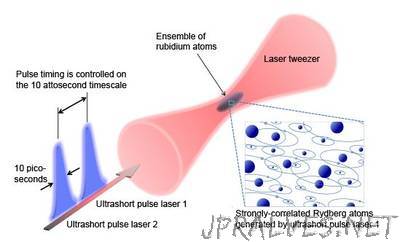
“Kenji Ohmori (Institute for Molecular Science, National Institutes of Natural Sciences, Japan) has collaborated with Matthias Weidemüller (University of Heidelberg), Guido Pupillo (University of Strasbourg), Claudiu Genes (University of Innsbruck) and their coworkers to develop the world’s fastest simulator that can simulate quantum mechanical1) dynamics of a large number of particles interacting with each other within one billionths of a second. The dynamics of many electrons interacting with each other governs a variety of important physical and chemical phenomena such as superconductivity, magnetism, and chemical reactions. An ensemble of many particles thus interacting with each other is referred to as a “strongly correlated system”2). Understanding the properties of strongly correlated systems is thus one of the central goals of modern sciences. It is extremely difficult, however, to predict theoretically the properties of a strongly correlated system even if one uses the post-K supercomputer3), which is one of the world’s fastest supercomputers planned to be completed by the year 2020 in a national project of Japan. For example, the post-K cannot exactly calculate even the energy, which is the most basic property of matter, when the number of particles in the system is more than 30. Instead of calculating with a classical computer such as the post-K, an alternative concept has been proposed and referred to as a “quantum simulator”4), in which quantum mechanical particles such as atoms are assembled into an artificial strongly correlated system, whose properties are known and controllable. It is then used to simulate and understand the properties of another strongly correlated system, whose properties are not known. A quantum simulator could simulate quantum mechanical behavior of many particles that cannot be handled even by the post-K, expected to become a next-generation simulation platform to replace supercomputers. Huge investment to the development of quantum simulators has therefore been started recently in national projects of various countries including US, EU, and China.”
